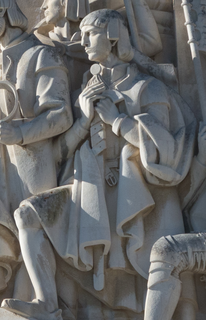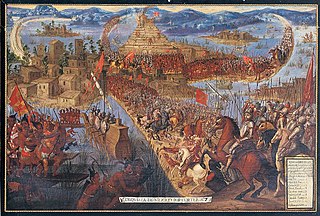
Hernán Cortés de Monroy y Pizarro Altamirano, 1st Marquess of the Valley of Oaxaca was a Spanish Conquistador who led an expedition that caused the fall of the Aztec Empire and brought large portions of what is now mainland Mexico under the rule of the King of Castile in the early 16th century. Cortés was part of the generation of Spanish explorers and conquistadors who began the first phase of the Spanish colonization of the Americas.

Tenochtitlan, also known as Mexico-Tenochtitlan, was a large Mexica altepetl in what is now the historic center of Mexico City. The exact date of the founding of the city is unclear. The date 13 March 1325 was chosen in 1925 to celebrate the 600th anniversary of the city. The city was built on an island in what was then Lake Texcoco in the Valley of Mexico. The city was the capital of the expanding Aztec Empire in the 15th century until it was captured by the Spanish in 1521.

Corte is a commune in the Haute-Corse department of France on the island of Corsica.

Gaspar Corte-Real was a Portuguese explorer who, alongside his father João Vaz Corte-Real and brother Miguel, participated in various exploratory voyages sponsored by the Portuguese Crown. These voyages are said to have been some of the first to reach Newfoundland and possibly other parts of eastern Canada.

Diego Velázquez de Cuéllar was a Spanish conquistador and the first governor of Cuba. In 1511 he led the successful conquest and colonization of Cuba. As the first governor of the island, he established several municipalities that remain important to this day and positioned Cuba as a center of trade and a staging point for expeditions of conquest elsewhere. From Cuba he chartered important expeditions that led to the Spanish discovery and conquest of Mexico.

The Cortes Generales are the bicameral legislative chambers of Spain, consisting of the Congress of Deputies, and the Senate.

Pánfilo de Narváez was a Spanish conquistador and soldier in the Americas. Born in Spain, he first embarked to Jamaica in 1510 as a soldier. He came to participate in the conquest of Cuba and led an expedition to Camagüey escorting Bartolomé de las Casas.

BC Ferries operates two T-class ferries for use on small inter-island routes. They have raised bows, which make it easier for the ships to travel in the rough seas often found on British Columbia's central coast. The ferries carry 30 cars and 150 passengers. Both were built in 1969. They were originally owned and operated by BC's Ministry of Transportation and Highways until 1985, when the Ministry's saltwater ferries and routes were transferred to BC Ferries, including the T class. The two T-class ferries are Tachek and Quadra Queen II.

La Noche Triste also known as La Noche Victoriosa was an important event during the Spanish conquest of the Aztec Empire, wherein Hernán Cortés, his army of Spanish conquistadors, and their native allies were driven out of the Aztec capital, Tenochtitlan.

The Discovery Islands are a group of islands located at the northern end of the Salish Sea and the eastern end of Johnstone Strait, between Vancouver Island and the mainland coast of British Columbia, Canada.

Desolation Sound is a deep water sound at the northern end of the Salish Sea and of the Sunshine Coast in British Columbia, Canada.
von Donop Marine Provincial Park, formerly Von Donop Marine Provincial Park, is a provincial park in British Columbia, Canada, located on the north end of Cortes Island in the Discovery Islands.

The Spanish conquest of the Aztec Empire, also known as the Conquest of Mexico or the Spanish-Aztec War (1519–21), was one of the primary events in the Spanish colonization of the Americas. There are multiple 16th-century narratives of the events by Spanish conquistadors, their indigenous allies, and the defeated Aztecs. It was not solely a contest between a small contingent of Spaniards defeating the Aztec Empire but rather the creation of a coalition of Spanish invaders with tributaries to the Aztecs, and most especially the Aztecs' indigenous enemies and rivals. They combined forces to defeat the Mexica of Tenochtitlan over a two-year period. For the Spanish, the expedition to Mexico was part of a project of Spanish colonization of the New World after twenty-five years of permanent Spanish settlement and further exploration in the Caribbean.

Cortes Island is an island in the Discovery Islands archipelago on the coast of British Columbia, Canada. The island is 25 km (15.5 mi) long, 13 km (8.1 mi) wide, and 130 km2 (50 sq mi) in area. It has a population of 1,035 permanent residents. Cortes Island lies within Electoral Area B of the Strathcona Regional District, which provides water and sewerage systems, fire protection, land use planning, parks, recreation, and emergency response.
The ƛoʔos Klahoose are one of the three groups comprising the 'ʔayʔaǰuθəm Tla'Amin or Mainland Comox. The other two divisions of this once-populous group are the χʷɛmaɬku Homalco and Sliammon. The Klahoose, Homalco and Sliammon are, according to oral tradition, the descendants of the survivors of the Great Flood. The three groups were split by colonialism into different band councils but united historically as the Tla A'min, known as the Mainland Comox, and K’ómoks, the larger grouping of the Comox people, also known as the Island Comox and before the merger with the Laich-kwil-tach culture. Historically both groups are a subgroup of the Coast Salish though the K’ómoks name is from, and their language today, is the Lik'wala dialect of Kwak'wala. The ancestral tongue is the Comox language, though the Sahtloot/Island dialect is extinct.

Sutil Channel is a broad strait located in the Discovery Islands of British Columbia, Canada.

The Captaincy General of Puerto Rico was an administrative district of the Spanish Empire, created in 1580 to provide better military management of the island of Puerto Rico, previously under the direct rule of a lone governor and the jurisdiction of Audiencia of Santo Domingo. Its creation was part of the, ultimately futile, Habsburg attempt in the late 16th century to prevent incursion into the Caribbean by foreign powers. Spain also established Captaincies General in Cuba, Guatemala and Yucatán.
Cortes, Cortés, Cortês, Corts, or Cortès may refer to:
Gillian (Gilean) Joan Douglas was a Canadian nature writer. While she was best known for her work as a poet, she was also an accomplished photo journalist, feminist, historian, and politician. Douglas' inspiration for her writing stemmed from her desire to be an independent woman in a patriarchal world. Her writings—her poems, articles, novels, and autobiographies—extend over a period of eighty years, including four marriages, ten years in the Cascade Mountains, and forty years on Cortes Island, British Columbia.
The MV Tenaka is a ferry previously owned by BC Ferries. She was built for BC's Ministry of Transportation and Highways in 1964 in Victoria, British Columbia by the Victoria Machinery Depot. Originally named the Comox Queen, she was renamed Tenaka in 1977 and became part of BC Ferries' fleet in 1985 when the Ministry of Transportation's saltwater ferries and routes were transferred to BC Ferries. As of April 2016, the Tenaka was sold to Lady Rose Marine Services, a tourism company operating out of Port Alberni, British Columbia.
















